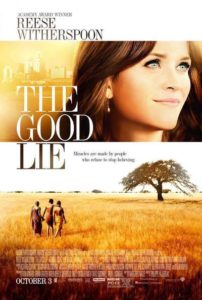
Reese Witherspoon (Walk the Line, Wild) is the only name you’ll recognize in this film, but she is by no means the star. So is the film better off for having her? I think most movies are better off given the choice of having Witherspoon as a star versus not. The movie is better because she is in it. And it certainly helped bring audiences to the theaters. And while I do think the film needed her to succeed, and while she did a great job, she was the first to say that this story is by no means about her. She just wanted to bring awareness to the story the best way she could.
The year is 1983, and the North and South are at war. Specifically, the South Sudanese are living under fire from the government of Sudan. Armed northern shooters storm into villages and kill at will. This is where the first part of our story takes place. After their mother and father, and just about everyone else they knew, are murdered, older brother Theo (around age 12) leads his younger sister Abital (around age 10) and younger brother Mamere (around age 9) on a 260-mile walk from their home. They travel to the border of Ethiopia, where they are advised to go if anything happens. Along the way, they meet up with Jeremiah and Paul (both around age 9). Watching these young children do is essential because their characters are genuinely defined here. Their story continues as they walk over 300 more miles to get to the border of Kenya. Along the way, they experience great hardship. Finally, they reach the Kakuma refugee camp, where they spend the next 13 years.
A humanitarian organization is set up, where 3600 of these young people would have the opportunity to come to America. “The Lost Boys” as they are called (mainly because most of those who get this opportunity are males), are placed in different parts of the United States. In our story, Mamere, Jeremiah, and Paul are assigned to Kansas City, MO, where they meet up with their employment specialist Carrie (Witherspoon). Faith-Based charities are sponsoring the boys, but a mix-up sort of puts Carrie as the person they first meet and, thus, they look at her as their savior. Carrie doesn’t exactly have her life together. She’s not a bad person by any means, but her job as an employment specialist is just that—a job. So, without even needing to say anything, we sort of know where this story is going. She learns more about the young men and what they’ve been through, and how they can remain so positive despite the lives, they have been dealt with. And as a result, she becomes more involved with their stories, and we start to see her as more than just an employment specialist. All three boys are fortunate for their new chance at life, but that does not mean everything goes as smoothly as they wished in this foreign land. They still have their traditions. And more importantly, they still have their morals and value systems. Unfortunately for them, because their hearts are so pure, they find themselves getting into a little bit of trouble on more than one occasion. And as time passes in this new country that starts becoming more familiar to them, they begin to separate from each other. All three characters have conflicted emotions, and why would they not? Their lives have been wholly uprooted (in an attempt to give them more of a chance in this world), yet they miss the friends they made in Kenya and wonder why they got “selected” when so many others did not. Other problems come into play in this movie, which I will not discuss here.
Though they have been in a couple of movies each, the adults who portrayed Mamere, Jeremiah, and Paul aren’t actors. Yet all three did such a masterful job here that our focus wasn’t even close to being on Witherspoon. She wasn’t introduced to this movie until about a third of the way through. By that time, you are so invested in the three leads that you don’t care one way or the other for her character. Her character isn’t meant to be unlikeable at all. It’s just that Carrie is a stark contrast to Mamere, Jeremiah, and Paul. Also, in this movie, Corey Stoll (Non-Stop, television’s The Strain) is named Jack. He is Carrie’s boss and a likable guy from the very first time we meet him. He lives on a farm, so the three young men fell right at home when they were over there with him. Together, these five individuals navigate through some red tape and laws that seem utterly ridiculous to fight for something significant to the young boys.
I recommend this movie. It falls in that 11-15 range of the top films of 2014.
Plot 8/10
Character Development 9/10
Character Chemistry 8.5/10
Acting 8/10
Screenplay 8/10
Directing 9/10
Cinematography 10/10
Sound 9/10
Hook and Reel 8.5/10
Universal Relevance 9/10
87%
Movies You Might Like If You Liked This Movie
- The Blind Side
- Lion
- Hotel Rwanda
- The Namesake
- Antwone Fisher